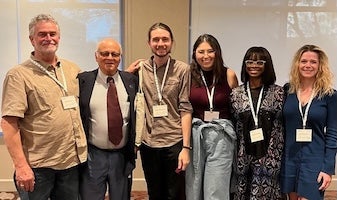Admissions
Is the GRE required for admission?
No.
Can I apply in both fiction and poetry?
Yes, however, an application will need to be completed for each genre for which you’re seeking admission.
When is the deadline for submitting application materials?
January 15th.
Where should I send my application materials?
All of your application materials should be submitted through the online graduate application. You can read the step-by-step application process here.
How many students are admitted each year?
2-3 in each genre.
How many applications do you receive per year?
The number of applications we receive varies from year to year. Our admission rate is usually between 3-5%. Applications come from all over the country and the world.
Do you offer Spring admission?
No.
When should I hear about the admission decision?
Starting the middle of March to April 15. Once all decisions have been finalized, an email will be sent to all applicants.
What percentage of admitted applicants receive some form of funding?
100% of admitted applicants receive a teaching assistantship or graduate assistantship. Both include a full tuition waiver, student health insurance, and a living stipend of $11,450 per year.
Who should write my letters of recommendation?
They should be written by someone who is either familiar with your writing ability or your academic work.
Can I apply if I wasn’t an English major?
Of course. By far the most important factor in the selection process is the quality of the writing sample, regardless of an applicant’s academic background.
Do I need to submit all transcripts or just the last degree completed?
You need to submit all transcripts of any institution you have attended. Even if you have a PhD, submit transcripts from Bachelor’s, Master’s and PhD degrees. You may submit unofficial transcripts for all United States-based post-secondary institutions you have attended beyond high school. If you are accepted to the program, you will then need to submit official transcripts. Important note: Transcripts from all non-US universities MUST be submitted as official documents, both from domestic and international students.
Where can I find information about how to apply as an international student?
You can find information about applying as an international student to the graduate program at Boise State here.
What language proficiencies are required for English as a second language students? Visit the International Admission website for requirements.
Do you offer an application fee waiver to any potential students?
Unfortunately, we are not able to offer application fee waivers.
The Program
How large is the average workshop?
Given the small number of accepted applicants in each genre, workshops are generally between 6-10 students.
Is there travel funding available? Yes! The College of Arts and Sciences (COAS) awards travel funding each year to graduate students. There are four application deadlines throughout the year. Our students have received travel funding to present at conferences such as the American Literary Translators Association, the Association of Writing Programs Conference (AWP) and the International Hemingway Conference.
Learn more about COAS Travel Funding and how to apply here.

Are there scholarships or other sources of funding? Yes! Each spring, the program awards the Glenn Balch MFA Prize for Fiction. All current MFA students may submit to the contest. Three finalists receive prizes ranging from $2000 – $250.
Additionally, the Alexa Rose Foundation provides grants to Idaho artists each year. Many of our students and graduates have received funding.
What are the graduation requirements?
The Boise State MFA Program is a three-year, 48-hour course of study requiring 12 credit hours of workshop, 6-9 credit hours of thesis completion done in students’ third year, and the remaining credit hours to be met through Form and Theory courses, the Idaho Review course, creative non-fiction workshops, translation workshops, screenwriting and electives in other fields. A book-length creative work is completed and defended during the third year.
Does Boise State feature visiting writers?
Yes! Each semester a number of visiting writers are brought to campus through The Hemingway Center Reading Series to give a public reading. Most visiting writers are in town for multiple days and students, whether at a formal reception or over informal drinks, are given time to interact and converse with them. Recent readers include Terrance Hayes, Norma Cole, Adam Johnson, Forrest Gander, Lydia Conklin, Srikanth Reddy, Joy Williams, Bhanu Kapil, Alice Notley and more.

TAships
What will you be teaching?
Mostly undergraduate Creative Writing courses in your genre. Options to lead discussion groups in Foundation of Arts classes and Graduate Assistantships working with The Idaho Review and Free Poetry.
How long is the program?
3 Years
Will I receive health insurance?
Yes. Health Insurance details here.
Boise and Community
Is there a literary community outside of the University?
Yes. Boise is home to the Cabin Literary Center, Ghost and Projectors, Storyfort, and Sema, all of which host readings.
What kind of distractions (from writing) exist in Boise?
In addition to a thriving arts community, Boise has a lively downtown. For the outdoor enthusiast, the town features a 28-mile long walking and biking path called the Greenbelt that runs along the Boise River, as well as an extensive system of foothills hiking trails.
What about readings? So glad you asked! There are numerous opportunities to read your work in Boise (and beyond). Each semester, the MFA Program hosts Tooth and Bristle, a beloved reading and tradition in the program in which students read their work and introduce each other.
Each spring, the Treefort Music Fest takes over Boise (in the best way). Storyfort is the literary festival connected to Treefort, and our students read their work as part of the programming.
Other local literary and art organizations, such as Backyard Artists and the Duck Club, also frequently host readings and invite our students to participate.

Is the program on social media?
We sure are! Follow us on Instagram @boisestatemfa and on Facebook: Boise State University MFA in Creative Writing